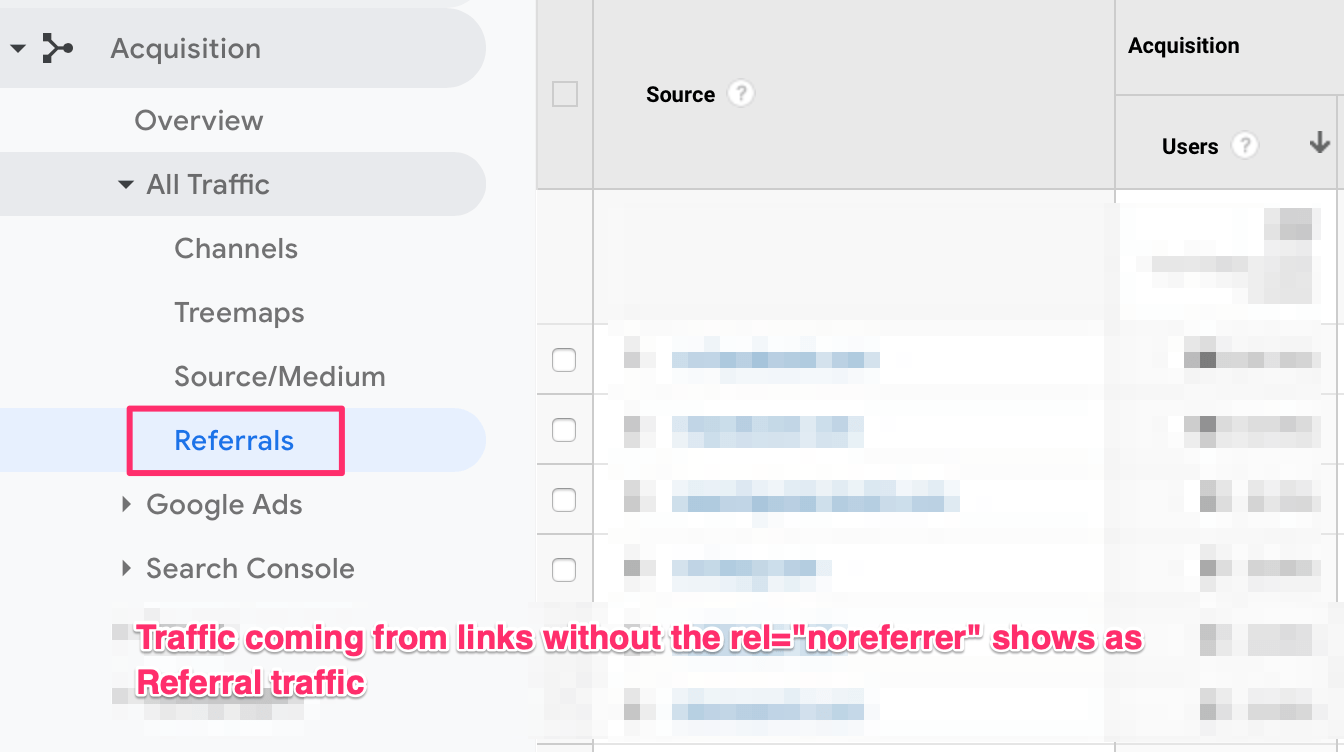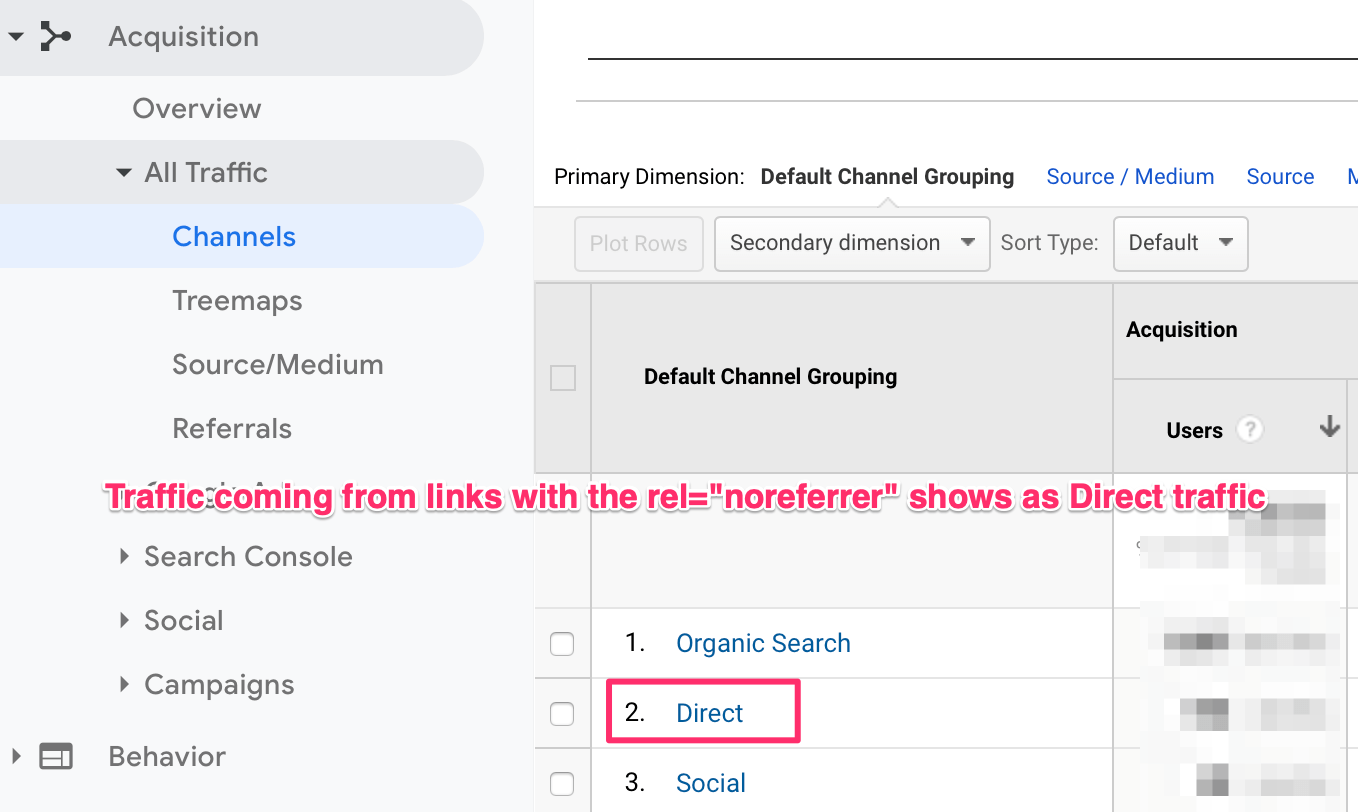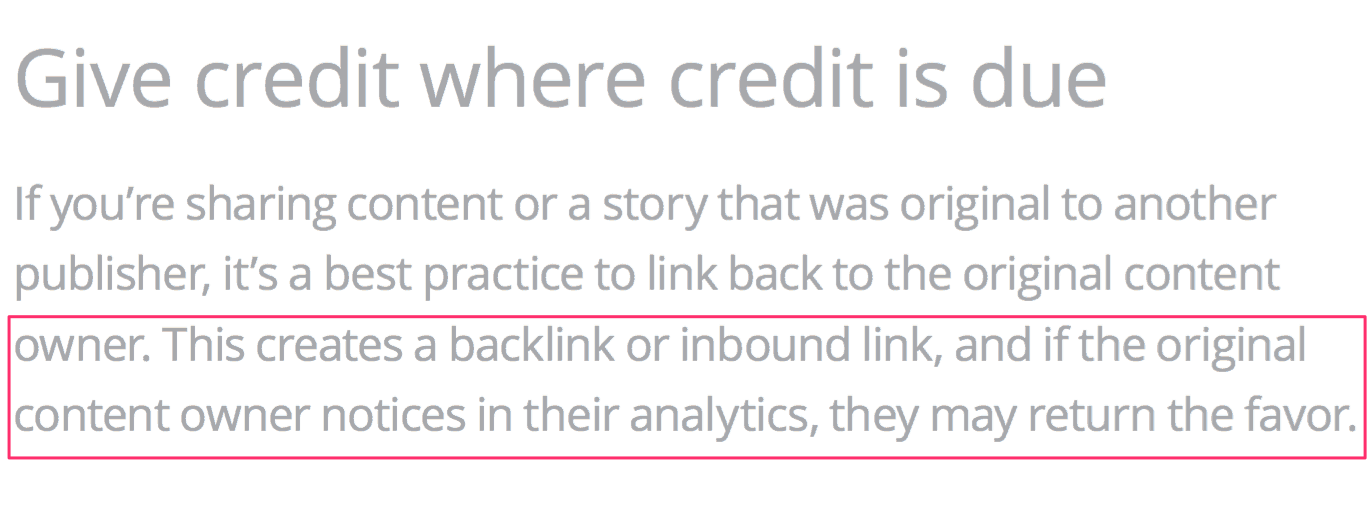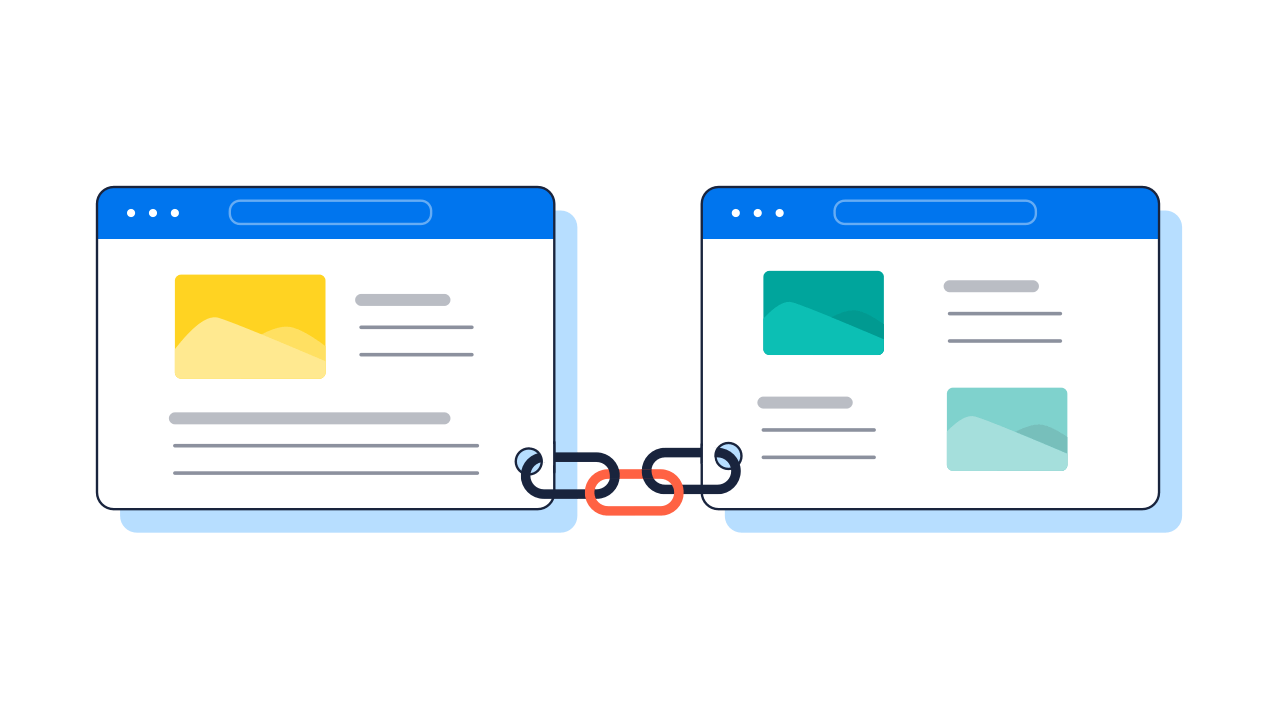“Noreferrer noopener”, are HTML attributes that can be added to outgoing links. What do these tags do and how they can impact your SEO efforts?
In this post, I will explain the difference between noreferrer and noopener tags, how they are different from the nofollow tag, and the impact on SEO when each one is used.
- What is rel=”noreferrer”?
- When to use rel=”noreferrer”?
- rel=”noreferrer” and SEO
- Noreferrer and WordPress
- Noreferrer and Affiliate links
- The Difference Between Nofollow and Noreferrer
- What is rel=”noopener”?
- rel=”noopener” and SEO
Let’s start with some definitions.
What is rel=”noreferrer”?
The rel=”noreferrer” tag is a special HTML attribute that can be added to a link tag (<a>). It prevents passing the referrer information to the target website by removing the referral info from the HTTP header.
This means that in Google analytics traffic coming from links that have the rel=”noreferrer” attribute will show as Direct Traffic instead of Referral.
This is how the noreferrer attribute looks in HTML View:
<a href="https://www.example.com" rel="noreferrer">Link to Example.com</a>
Here is an example to understand this better:
Let’s say that you link from website A to Website B without the “noreferrer” tag.
When the owner of website B views the ‘ACQUISITION’ report in Google Analytics, he can see traffic coming from Website A, under the ‘REFERRALS’ section.

When you link from Website A to Website B using the “noreferrer” tag, any traffic going from Website A to Website B will show as DIRECT traffic in Google Analytics (and not referral).

When to use rel=”noreferrer”?
Use the rel=”noreferrer” attribute on outgoing links when you don’t want other sites to know that you are linking to them. Can’t think of any valid reason why you might want to do this, but that’s the case.
Definitely do not use the rel=”noreferrer” attribute on internal links, it can mess up with your Google analytics reports.
rel=”noreferrer” and SEO
Adding the noreferrer tag to your links does not directly impact SEO. You can safely use it without worrying about anything.
But it does have an indirect effect in your link building and promotion efforts and the reason is the following:
One of the ways to get the attention of other webmasters is to link to their sites. All webmasters check their Google analytics on a daily basis and especially the ‘Referral traffic’.
When they see traffic from a website, they will most probably check it out and share the page in social media, follow the author or even decide to return the favor by linking back.
This is good for SEO and in fact, it is something that Google recommends as a valid way to get links from other websites (see below the relevant quote from a Google document).

When you have the noreferrer tag attached to your links, nothing from the above will happen because traffic from your website will not show as ‘Referral’ in Google analytics and so the other webmasters will not know that you have linked to them.
You might be thinking, ‘Why even talk about this, I will not add it to my links and that’s the end of the story’.
The reason that this issue has become popular is that WordPress adds the ‘noreferrer’ tag by default to all outgoing links that are set to open in a ‘new tab.’
Noreferrer and WordPress
So, if you are on WordPress you should know that when you add an external link to your content and set it to open in a ‘new tab’ (target=”_blank”), WordPress will automatically add rel=”noopener noreferrer” to the link.
They did this to improve the security of WordPress rich editor (TinyMCE) and to prevent tabnapping and other phishing attacks.
Here is an example:
<a href="https://www.externalsite.com/" target="_blank" rel="noopener noreferrer">my external link</a>
As explained above, this will prevent any information to be passed to the new tab and the end result is that any traffic that will go from your website to the linking website (by clicking the link), will not be shown in Google Analytics.
How to remove rel=”noreferrer” from WordPress links
The easiest way to prevent WordPress from automatically adding the attribute to external links is NOT to open the links in a new tab. In other words, to have the links open in the same window.
This is the simplest way to deal with this problem but the drawback is that users clicking the external link will leave your website and this might increase your bounce rate, decrease time on site, etc.
Nevertheless, since the majority of traffic is now coming from mobile devices, you shouldn’t worry too much about users exiting your website since the behavior of the ‘new tab’ on mobile makes it difficult for users to come back to the previous window.
There are plugins that prevent WordPress from adding the rel=”noreferrer” to external links but they only work when using the TinyMCE and NOT the new editor (Gutenberg).
My recommendation is not to mess with this, just avoid opening external links in a new tab and you are good to go.
Noreferrer and Affiliate links
Noreferrer has no impact on affiliate links. The reason is that the majority of affiliate programs do not rely on ‘referral traffic’ to award a conversion but on the affiliate ID which is included in the link. For example:
<a href="//www.semrush.com/sem/?ref=15096612" rel="noreferrer noopener" target="_blank">
So, you have nothing to worry about.
The Difference Between Nofollow and Noreferrer
When you add rel=”nofollow” to an external link, you basically instruct search engines not to pass any PageRank from one page to the other. In other words, you tell them to ignore that link for SEO purposes.
The difference between nofollow and noreferrer is that noreferrer does not pass any referral information to the browser but the link is followed. With nofollow, referral information is passed to the browser but the link is not followed.
So, they are not the same things. Use nofollow on links that you don’t trust and use noreferrer if you don’t want the other site to know that you have linked to them.
What is rel=”noopener”?
rel=”noopener” is an HTML attribute that can be added to external links. It prevents the opening page to gain any kind of access to the original page.
Here is an example of a link with the rel=”noopener” tag:
<a href="https://www.example.com" rel="noopener">Link to Example.com</a>
This is added automatically by WordPress on all external links that open in a new tab for security reasons and it is recommended that you keep it.
If you are not on WordPress, it is recommended to add the rel=”noopener” to all your external links that open in a new tab.
Rel=”noopener” and SEO
Noopener has zero impact on your SEO so you can safely use it to enhance the security of your website.
Key Learnings
Dealing with HTML tags and attributes is confusing for many people but that shouldn’t be the case with noreferrer and noopener.
None of them can negatively impact your SEO, use them without fear.
If you are on WordPress, these tags are added automatically on external links that open in a new tab.
The noopener is needed to enhance the security of your website and prevent other websites from gaining access to your page (through the browser session).
The noreferrer is used to protect referral information from being passed to the target website and this also hides referral traffic in Google analytics.
If you want other websites to see traffic from your website as ‘Referral traffic’, then simply do not open external links in a new tab. This will prevent WordPress from automatically adding the attributes to the links and everything is good.
Nofollow is not the same as noreferrer. When the rel=”nofollow” is added to a link, it instructs search engines not to use that link for SEO purposes. Noreferrer does pass link juice from one website to the other.
If you are still confused about the role of rel=”noreferrer noopener”, let me know in the comments.





Hi Alex,
Is a noopener link , a dofollow link? Thanks for giving me such valuable information.
Hi Sarah
Yes, it’s a dofollow link. All links are by default ‘do follow’ unless they have the ‘nofollow’ tag. Read this post for more information.
Hope this helps
Alex
What are you thoughts on adding rel=”noreferrer noopener” to Amazon affiliate links? In this article (which really helped me BTW!) it’s states that adding this to affiliate links has no impact, but from what I understand Amazon need to be able to see all referrer information, and not being able to with give you a high chance of flagging your account, which give it a high chance of being banned. Just wondering if you or anyone has any more info on this bit? Is Amazon a special exception do you think and we should avoid this just for Amazon?
According to Alex in this great article, the labels nofollow, noopener and noreferrer do not affect the success of the conversion.
In my case, I use “nofollow noopener noreferrer” in all Amazon affiliate links and I have not had any problems.
Thanks for the detail explanation about norefferr and noopener. i was worry about these tags when added to my link automatically
from the last time I am very confused about noreffers now I am happy after reading your post.
Thanks 🙂
hi alex can we use rel=”noopener tag on internal links ?
thank you
Hi Arwan
There is no reason to do this. It won’t do any harm but why should you do it?
Thanks
HI Alex, great article. A question here: if an interview I gave to a blog links back to my page using a ‘noreferrer’ tag, what are the implications for my DA?
What I mean here is, if the traffic will show as direct and not referred to my site from the blog, will the links still count towards my DA score?
Will they show as a site linking to my page for PA purposes? My thought here is no.
My understanding is that the link will count as “a link” to my site, but even though the blog has a relatively high DA, it won’t be contributing value from that because of the ‘noreferrer’ tag. Does that sound correct?
Many thanks,
Rex.
Hi Rex
The link will still count. The ‘noreferrer’ tag does not change the value of a link. If any link does not have the ‘nofollow’ attribute then it means is a ‘normal’ link and will count towards your DA.
Hope this helps
Alex
Is noreferrer noopener tags good for internel links?
Hi Dr Shivuk
No. You should not use these tag for internal links. It will mess up your Google analytics reports.
Thanks
Alex
This is great help! this used to be such a huge confusion for me. very well explained
Hi Aniket
Glad I could help you understand this better.
Alex
Hi, Thanks for the content which you explained about noreferer and noopener, but I have a doubt, is it good for backlinks which I built for a website?
Thank You for this information. But I have a question.
If i am doing internal Page Linking on my blog Post in WordPress then I Should use Open link a new tab or not?
Hi Maria
Not necessarily. You can open internal links in the same tab.
I hope this helps
Alex
Please discuss accessibility. It is recommended to open links in the same tabs/windows unless you provide notice(title=”opens in a new tab”). Using noopener seems desirable for an external link, but then that doubles what I do to each external link. One page with three links – ok. 150 pages with multiple links? not so much
A reason why someone would want to use this is if you own 2 sites that link to each other but you don’t want your analytics showing you that people got to one site from the other. This way you can be sure any hits in the ‘referral’ part of google analytics were definitely from a site you don’t already own.
Nicely Explained! Previously I thought that noopener and nofollow are the same things! but your explanation has cleared my wrong thought. Thanks for sharing this helpful content with us.
Hi Alex,
Thanks for clearing the confusion. It was really helpful.
Thanks for the share.
Have a good week ahead.
Hello Chris,
I have few doubts:
Is it fine to use nofollow, noopener and noreferer together or any combination of noopener or noreferer with the nofollow tag correspondingly?
And secondly does using noreferer in internal linking harm SEO in any way?
Thanks in advance!
Hi!
Man just perfectly explained. Everything is clear right now. Few minutes ago, when I first saw something like noopener & noreferrer I was super confused. After reading your article now I’m good to create links.
Main thing is both noopener & nooreferrer links are do follow.